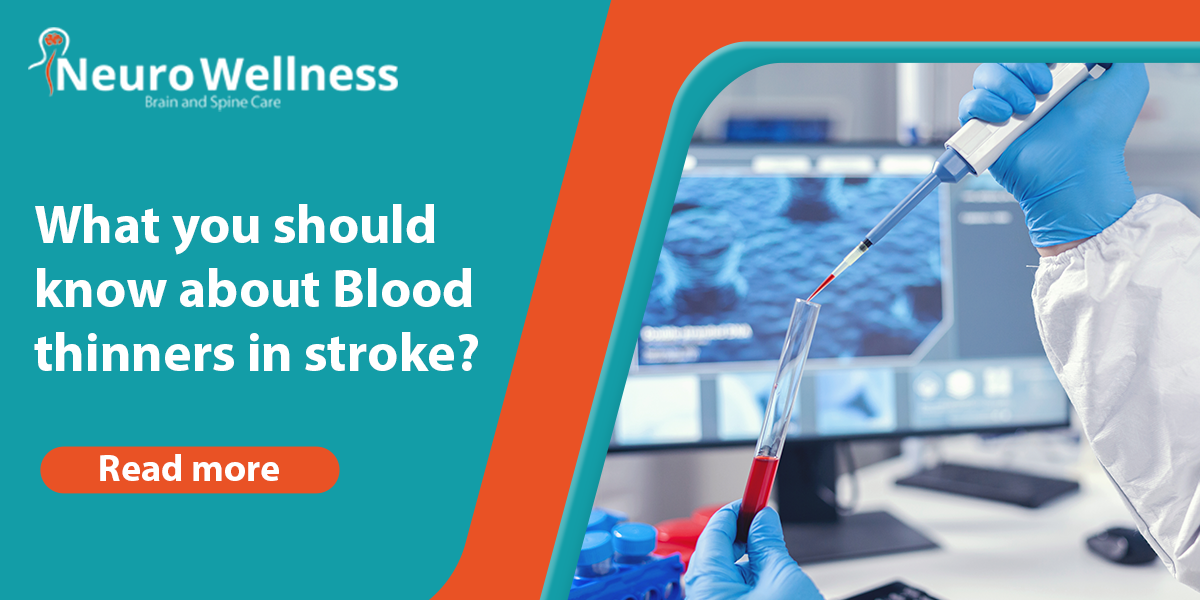What you should know about common blood thinners used in brain stroke?
Medications that thin the blood can help you avoid a stroke caused by a clot (ischaemic stroke). This drug may be prescribed to you after a stroke or a transient ischemic attack (TIA) to help you avoid another stroke. If you have a health condition like heart trouble or a blood-clotting illness that could lead to a stroke, you may need blood-thinning medicine.
This medical information can assist you in discussing your options with your doctor. If you have any medication-related questions, you should consult your doctor, as a guide can only provide broad information.
What are blood-thinning medications?
Blood thinners like double edged sword. If their action is less blood clots , if too much action it can cause bleed in the brain. They function in different ways to prevent blood clots from developing. They alter the function of several blood cells and proteins.
This information pertains to a stroke-prevention drug.
Why are they used?
One of the most important methods to lower your risk of stroke is to take this medicine. If you’ve already had a stroke or have a health condition that puts you at risk of having one, it can help.
A stroke caused by a bleed.
Approximately 15% of strokes are caused by bleeding in or around the brain. A hemorrhagic stroke is a medical term for this. Blood-thinning medications can either increase or worsen the risk of this type of bleeding.
what are the Common blood thinners and their side effects-
Acetylsalicylic acid (aspirin): Aspirin has been used for a long time. It inhibits platelet aggregation, which means it prevents tiny cells from clumping together.
Although aspirin can help prevent secondary strokes, it is not advised as a preventative medication since the risks of bleeding and other side effects exceed the benefits for persons who have never had a stroke. Aspirin should only be used in extremely particular circumstances and under the care of a doctor, according to new guidelines.
Bleeding is a common side effect
Coumadin (warfarin): It is a blood thinner that blocks vitamin K’s action, which is required for healthy blood coagulation.
Coumadin is often prescribed for individuals with cardiac abnormalities that could lead to stroke, such as heart valve replacement, to assist avoid recurrent stroke.
Because an overdose of Coumadin can cause significant bleeding anywhere in the body, its action must be closely monitored with a blood test called the International Normalized Ratio (INR). Coumadin patients must be cautious since falls can result in significant, life-threatening bleeding.
Clopidogrel (Plavix): It is a blood thinner that affects platelet function. It is frequently used for stroke prevention, but it has a number of adverse effects, including bleeding, a low white blood cell count, and a rare condition known as thrombotic thrombocytopenic purpura, which is characterized by microscopic blood clots.
Aggrenox (aspirin and dipyridamole): It reduces the risk of stroke by combining aspirin with dipyridamole, a blood thinner that slows platelet activity by blocking enzymes associated with platelets. Bleeding, bruising, and headaches are all possible side effects.
Pradaxa (dabigatran): It is a blood thinner that prevents blood clotting by inhibiting the enzyme thrombin. This medicine has been shown to lower the risk of stroke in people with atrial fibrillation, but it can also induce bleeding and interfere with wound healing.
Eliquis (apixaban): It is a blood thinner that works by preventing thrombin from being activated. It’s been approved to prevent strokes in people who have atrial fibrillation that isn’t caused by a heart valve condition. It raises the risk of bleeding, just like other blood thinners.
Xarelto (rivaroxaban): It is a blood thinner that works by interfering with two separate phases in the clotting cascade to prevent blot clot formation. Xarelto is licensed for stroke prevention in adults with atrial fibrillation and only needs to be taken once a day. It can cause bruising and bleeding, just like other blood thinners.
Why are blood thinners used in stroke?
Following a transient ischemic attack (TIA) or an ischemic stroke, many patients are offered anticoagulants or antiplatelet medicines to avoid blood clots. The two most typically recommended blood thinners for stroke patients are antiplatelet and anticoagulation medicines. These drugs work by interfering with the blood’s natural clotting ability. Platelets are small cells that travel through our bloodstream. The ordinary individual may bleed a little after a cut, but due to the aforementioned platelets attaching to one another, the rate of bloodletting will slow down rather rapidly.
Clotting is defined as the phenomenon of platelets adhering to one another. Antiplatelets (also known as platelet aggregation inhibitors) disrupt the clotting process, reducing the likelihood of potentially hazardous blood clots developing. Aspirin, dipyridamole, clopidogrel, or one of the above combined with aspirin, a headache drug with antiplatelet qualities, are some of the most common antiplatelet pharmaceuticals now available.
Risks:
Stroke survivors who are at risk of deadly blood clots are frequently taken blood thinners. Unfortunately, the blood thinners used to avoid such clots might raise the risk of brain bleeding, which can lead to hemorrhagic stroke. In addition, several common blood thinners may interact with other over-the-counter drugs, vitamins, and prescriptions, lowering their effectiveness and potentially causing hazardous adverse effects.
Summary:
Blood thinners like double edged sword are among the most basic drugs, yet they also present some of the most challenging choices in stroke treatment. While they have been shown to decrease stroke, the danger of bleeding can create difficulties ranging from poor wound healing to tiny areas of bruising to life-threatening hemorrhage.
The decision about whether or not to take a blood thinner should be made in cooperation with your doctor, who will assess your stroke risk as well as your bleeding risk.
Neurowellness provide high quality Advanced Stroke treatment in Bangalore at affordable cost in comparison with the other medical treatment options world wide.

